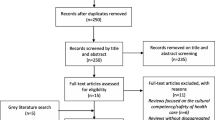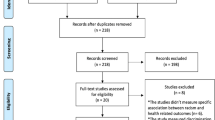Abstract
This paper reports language differences in poor/fair self-rated health (SRH) among adults from six Hispanic groups in the United States. Data are from the cross-sectional 1997–2013 National Health Interview Survey (NHIS). The total sample of Hispanic adults with valid information for the variables considered in the study (n = 156,374) included Mexican-Americans (Mex-Am; n = 43,628), Mexicans (n = 55,057), Puerto Ricans (n = 14,631), Cubans (n = 8,041), Dominicans (from Dominican Republican, n = 4,359) and Other Hispanics (n = 30,658). We compared percentage of the population that reported poor/fair SRH among Hispanic individuals by language of interview and across origins using bivariate tests of association. Multivariable logistic regression analysis was used to study the odds of reporting poor/fair SRH based on language among the overall population and each group. Among the six Hispanic origins Puerto Ricans (15.92%), Cubans (16.36%) and Dominicans (15.32%) reported poor/fair SRH at higher levels than the overall sample (12.32%). In the logistic regression model adjusting potential covariates, those interviewed in Spanish were at higher odds of reporting poor/fair SRH than those interviewed in English (OR = 1.47, p < 0.0001). In the stratified analysis, Mexican–Americans were the only group where language of interview did not affect the odds of reporting poor/fair SRH. There are differences by Hispanic origin for reporting poor/fair SRH, and also by language of interview. Achieving accurate measurement of health status among Hispanics is a concern for all researchers, in particular those who study differences in health status by race/ethnicity in the United States. Future, research should account for Hispanic background and language of interviews.
Similar content being viewed by others
References
Ruiz JM, Steffen P, Smith TB. Hispanic mortality paradox: a systematic review and meta-analysis of the longitudinal literature. Am J Public Health. 2013;103:52–60.
Hummer RA, Powers DA, Pullum SG, Gossman GL, Frisbie WP. Paradox found (again): infant mortality among the Mexican-origin population in the United States. Demography. 2007;44:441–57.
Arias E. United States life tables by Hispanic origin. Vital Heal Stat. 2010;2:1–33.
Markides KS, Coreil J. The health of Hispanics in the southwestern United States: an epidemiologic paradox. Public Health Rep. 1986;101:253–65.
Viruell-Fuentes EA, Morenoff JD, Williams DR, House JS. Language of interview, self-rated health, and the other Latino health puzzle. Am J Public Health. 2011;101:1306–13.
Finch BK, Hummer RA, Reindl M, Vega WA. Validity of self-rated health among Latino(a)s. Am J Epidemiol. 2002;155:755–9.
Dowd JB, Zajacova A. Does the predictive power of self-rated health for subsequent mortality risk vary by socioeconomic status in the US? Int J Epidemiol. 2007;36:1214–21.
Zajacova A, Dowd JB. Reliability of self-rated health in US adults. Am J Epidemiol. 2011;174:977–83.
Eriksson I, Undén a L, Elofsson S. Self-rated health. Comparisons between three different measures. Results from a population study. Int J Epidemiol. 2001;30:326–33.
Dubard CA, Gizlice Z. Language spoken and differences in health status, access to care, and receipt of preventive services among US hispanics. Am J Public Health. 2008;98:2021–8.
Mäntyselkä PT, Turunen JHO, Ahonen RS, Kumpusalo EA. Chronic pain and poor self-rated health. JAMA. 2003;290:2435–42.
Manor O, Matthews S, Power self-rated health and limiting longstanding illness: inter-relationships with morbidity in early adulthood. Int J Epidemiol. 2001;30:600–7.
McGee DL, Liao Y, Cao G, Cooper RS. Self-reported health status and mortality in a multiethnic US cohort. Am J Epidemiol. 1999;149:41–6.
Benyamini Y, Blumstein T, Lusky A, Modan B. Gender differences in the self-rated health-mortality association: is it poor self-rated health that predicts mortality or excellent self-rated health that predicts survival? Gerontologist. 2003;43:396-405-375.
Shetterly SM, Baxter J, Mason LD, Hamman RF. Self-rated health among Hispanic vs non-Hispanic White adults: The San Luis Valley health and aging study. Am J Public Health. 1996;86:1798–801.
Bzostek S, Goldman N, Pebley A. Why do Hispanics in the USA report poor health? Soc Sci Med. 2007;65:990–1003.
Lorraine PJ, Hammock RL, Blanton JM. Predictors of self-rated health status among Texas residents. Prev Chronic Dis. 2005;2:A12.
Brewer JVV, Miyasato GS, Gates MA, Curto TM, Hall SA, McKinlay JB. Contributors to self-reported health in a racially and ethnically diverse population: focus on Hispanics. Ann Epidemiol. 2013;23:19–24.
Kandula NR, Lauderdale DS, Baker DW. Differences in self-reported health among Asians, Latinos, and non-Hispanic Whites: the role of language and nativity. Ann Epidemiol. 2007;17:191–8.
National Center for Health Statistics Office of Information Systems. 2013 National Health Interview Survey (NHIS) Data Release. Atlanta, Georgia; 2013.
Manor O, Matthews S, Power C. Dichotomous or categorical response? Analysing self-rated health and lifetime social class. Int J Epidemiol. 2000;29:149–57.
Minnesota Population Center and State Health Access Data Assistance Center. Integrated health interview survey series: version 5.0 [internet]. Minneapolis: University of Minnesota; 2012. http://www.ihis.us.
Center for Diseases Control and Prevention. NHIS Spanish Questionnaire-Family. Center for Disease Control and Prevention; 2014.
Acevedo-Garcia D, Bates LM, Osypuk TL, McArdle N. The effect of immigrant generation and duration on self-rated health among US adults 2003–2007. Soc Sci Med. 2010;71:1161–72.
Idler EL, Benyamini Y. Self-rated health and mortality: a review of twenty-seven community studies. J Health Soc Behav. 1997;38:21–37.
Hamilton T, Hummer R. Immigration and the health of U.S. black adults: does country of origin matter? Soc Sci Med. 2011;73:1551–60.
Subramanian SV, Acevedo-Garcia D, Osypuk TL. Racial residential segregation and geographic heterogeneity in black/white disparity in poor self-rated health in the US: a multilevel statistical analysis. Soc Sci Med. 2005;60:1667–79.
Lara M, Gamboa C, Kahramanian MI, Morales LS, Bautista DEH. Acculturation and Latino health in the United States: a review of the literature and its sociopolitical context. Annu Rev Public Health. 2005;26:367–97.
Wallace PM, Pomery EA, Latimer AE, Martinez JL, Salovey P. A review of acculturation measures and their utility in studies promoting Latino health. Hisp J Behav Sci. 2010;32:37–54.
Thomson MD, Hoffman-Goetz L. Defining and measuring acculturation: a systematic review of public health studies with Hispanic populations in the United States. Soc Sci Med. 2009;69:983–91.
SAS Institute. SAS/STAT Version 9.4. Cary: SAS Institute, Inc.; 2013.
Borrell LN. Self-reported hypertension and race among Hispanics in the National Health Interview Survey. Ethn Dis. 2006;16:71–7.
Schoenborn CA. Marital status and health: United States, 1999–2002. Adv Data. 2004;1–32.
Tripp-Reimer T. Reconceptualizing the construct of health: Integrating emic and etic percpectives. Res Nurs Health. 1984;7:101–9.
Spiers J. New perspectives on vulnerability using emic and etic approaches. J Adv Nurs. 2000;31:715–21.
Acknowledgements
This is a revised version of a paper presented at the annual meeting of the Population Association of America, March 31-April 2, 2016, Washington, D.C.; we appreciate the suggestions of attendees of the meeting. We thank Dr. Sarah E. Patterson for her feedback on a previous version of this article. We also thank the reviewers and editor of the JOIH for the reviews and suggestions. Alexis R. Santos-Lozada was supported by the Population Research Institute (PRI) at the Pennsylvania State University, which is supported by an infrastructure grant by the Eunice Kennedy Shriver National Institute of Child Health and Human Development (P2CHD041025). Matthew J. Martínez was supported by a Postdoctoral Fellowship through Spatial Structures in the Social Sciences (S4) and the Population Studies and Training Center (PSTC) at Brown University. The content is solely the responsibility of the authors and does not necessarily represent the official views of the funding agencies.
Author information
Authors and Affiliations
Corresponding author
Ethics declarations
Conflict of interest
The authors declared that they have no conflict of interest.
Rights and permissions
About this article
Cite this article
Santos-Lozada, A.R., Martinez, M.J. How Have You Been? or ¿Como estás?: Does Language of Interview Influences Self-Rated Health Among Hispanic Subgroups?. J Immigrant Minority Health 20, 766–775 (2018). https://doi.org/10.1007/s10903-017-0606-4
Published:
Issue Date:
DOI: https://doi.org/10.1007/s10903-017-0606-4




